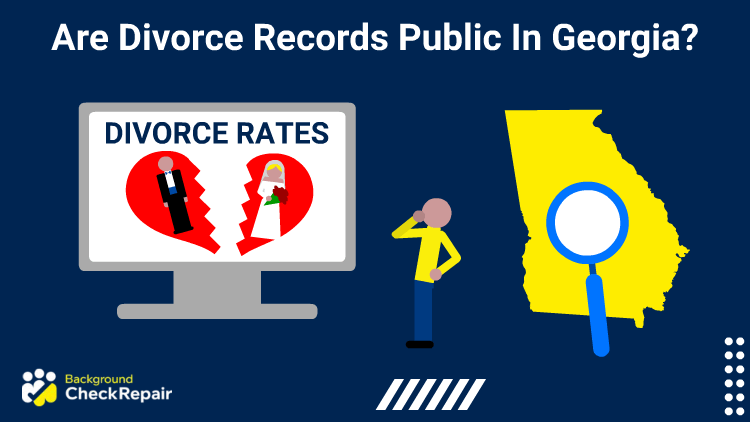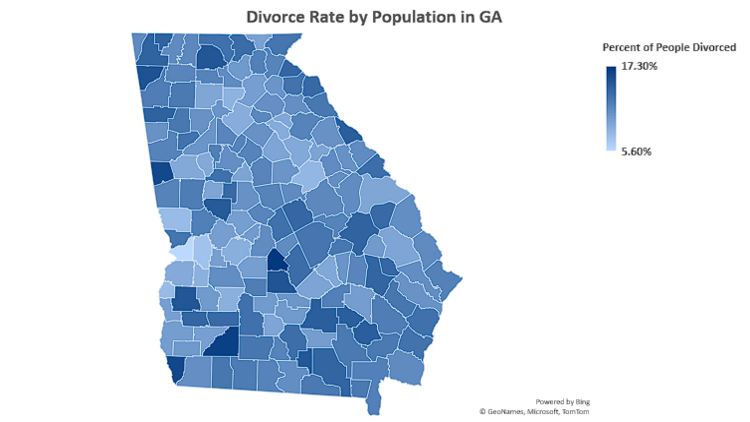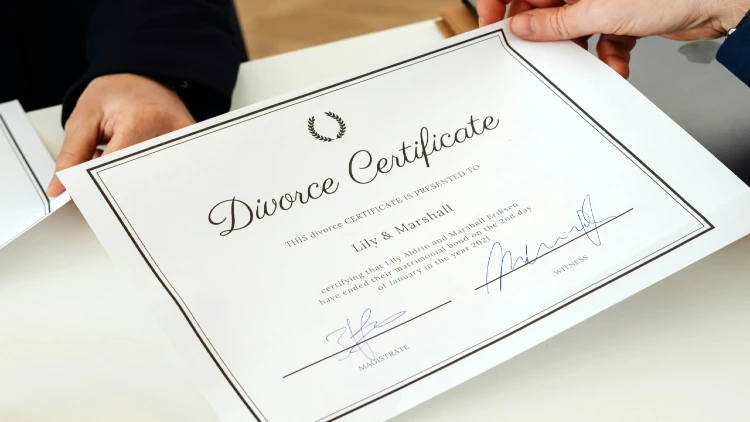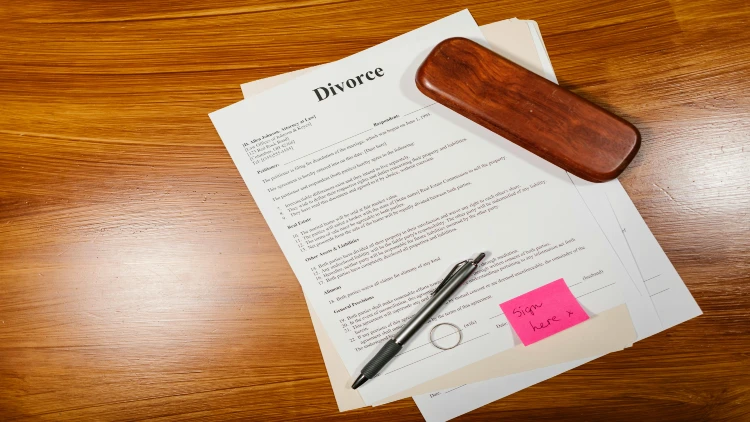
Are divorce records public in Georgia? Every state has its own method for sorting and releasing public records, and Georgia is no different. In GA, divorce records are public and part of what shows up on a background check.
And, since these records are public in the state, seeing any GA divorce record is just a matter of knowing where to look.
Whether it’s certified proof of divorce, a copy of written agreements and contracts, or general information such as the date and place of divorce being sought, these documents and more are available, both online and through manual requests.
This guide provide all the information about finding divorce resources in the state of Georgia, including how to find Georgia divorce information for free.
In fact, by doing a name-based search, anyone can find out, ‘are divorce records public in Georgia,’ right now.
Are Georgia Divorce Records Public? (Public Divorce Records GA)
Many have had occasion to ask “Are Georgia divorce records public?” and to that point, Georgia is a huge proponent of public records access. According to the Open Records Act (O.C.G.A. §50-18-70),21 Georgia policy strongly favors an open government system where the public has unrestricted access to court records (cases sealed by the court for special situations are exempt).16
Much of Georgia’s government functions are handled at the county level by one of the state’s 159 county courts.13 Divorce cases are settled in the county Superior Court, and the clerk of the Superior Court maintains divorce records, as well.7,19 The Superior Court clerk is the official who can provide certified copies of divorce records and decrees to interested parties.16

Electronic copies of divorce records can be difficult to obtain, but many of Georgia’s counties have online portals that allow users to access and view court documents (usually for a small fee).14
How To Find Divorce Records Online for Free
Anyone who has ever wondered “Are divorce records public in Georgia?” is likely also curious about how to see those records online, for free. County governments retain divorce information and provide access according to their individual laws. Unfortunately, this also means that each county dictates if and what they charge for access to the records. In some counties, an individual can find and view divorce records online for free, but most counties do charge a nominal fee.
The Georgia Courts website provides a directory of links to county Superior Courts’ electronic access portals.22 Each link leads to the same external site (PeachCourt) which provides electronic access to all of Georgia’s county court records and documents.8 Unfortunately, this is not an absolutely free service, as there is a small fee for viewing documents.
To use this system, individuals must register and create an account. The basic account is free, and it is also free to search for records. However, to view the records, users are required to input a payment method and pay a small processing fee (~$3.00). This method is not completely free, but it is quicker, easier, and cheaper than getting a certified copy from the courthouse. Follow these steps to conduct a divorce record search via this route.
Step 1: Select the county link from the Georgia Courts page.
Be sure to select the Superior court rather than the state link.
Step 2: Select “Register” to create an account.
Step 3: Enter the required information for set-up and click “Complete Registration.”
Step 4: Select the county of interest from the “County” drop-down menu.
Step 5: Choose to search by “Case Number” or “Party Name,” enter the required information and click “Search.”
Step 6: Scan the list of search results to identify the correct case (when searching by party name, the results yield all available court records, not just divorce records).
Step 7: Scroll down to find the divorce record desired (Judgment and Decree are typically toward the bottom of the list) and click “View.”
Step 8: Enter a payment method and select “View” once more. The payment and request should be processed within 24 hours
There are 12 counties (Chatham, Cherokee, Clayton, Decatur, DeKalb, Douglas, Floyd, Fulton, Glynn, Gwinnett, Lowndes, and Rockdale) without links in the directory, and they either use their own online county database for court record searches or do not have an online lookup system.
Are Divorce Records Public in Georgia? All Counties
For example, Fulton County uses its own public records access portal which also requires account registration,23 and Clayton County offers a registration-free court case inquiry.24 Meanwhile, Douglas County does not currently have an online access system.25
When official, certified copies of divorce records cannot be obtained online, contact the Superior Court for the county where the divorce occurred.16 Find the links to each county’s Superior Court in the table below. How Do I Do A Fulton County Smart Search?

(Image: Karolina Kaboompics34)
The Fulton County government has its own, separate electronic database and records access portal (see Fulton County Magistrate, State, and Superior Court Record Search).26 A registered account is required to use Fulton’s online search system. Follow these steps to do a Fulton County smart search.
Step 1: Click the link: Fulton County Magistrate, State, and Superior Court Record Search
Step 2: Click “Register” at the top right of the page.
Step 3: Enter the required information to create an account and click “Next.”
Step 4: Verify your email address.
A link will be emailed from Fulton County within 24 hours. Follow the link to “Log In” to the account.
Step 5: Select “Registered User” from the drop-down menu.
Step 6: Agree to “Terms and Conditions” and “Submit.”
Step 7: Click the “Home” button.
Step 8: Click the “Smart Search” icon to proceed.
Step 9: Enter record number or last name and first name (middle initial optional) for search and “Submit.”
Step 10: Scan results for desired case records or modify the search for specific criteria.
Access any specific county by simply searching the name online.
What To Know About Divorce in Georgia
Georgia is a “no-fault” divorce state, meaning that an individual can file for divorce without proof of a spouse’s wrongdoing. Georgia’s divorce law (O.C.G.A. § 19-5-3) provides for thirteen legal grounds to petition for divorce. An individual may file for divorce if:12
- The spouse displays habitual intoxication
- The spouse has an incurable mental illness (see stipulations)
- The spouse treats them cruelly
- The spouse commits adultery after marriage
- The spouse is convicted of a crime of moral depravity, resulting in a prison sentence of two years or greater
- The spouse exhibits willful and continued desertion for a period of one year
- The spouse was pregnant by another man at the time of marriage and did not disclose the information
- The spouse forced or coerced them into marriage
- The spouse is related or kin within the prohibited degrees
- The spouse was impotent at the time of marriage
- One party was mentally incapacitated at the time of marriage
- The marriage is irretrievably broken
Filing for divorce under any of the above conditions except the marriage being irretrievably broken requires proof of fault or guilt.18
Georgia is considered an equitable distribution state and aims to divide assets fairly, but this doesn’t mean parties can expect a 50-50 split of assets. Division of assets depends on many factors, including the type of divorce filed.1
There is more than one type of divorce in the state of Georgia. A divorce case can be uncontested, contested, or by publication.3
Uncontested Divorce
An uncontested divorce is one where the parties agree to the divorce and also agree upon how assets and responsibilities should be divided or distributed. This is sometimes referred to as a collaborative divorce.
Contested Divorce
A contested divorce is one in which the parties do not agree on some aspect of the divorce. One of the parties may not wish to divorce, or there may be some conflict in determining how responsibilities, debts, and assets are divided. Contested divorce cases are often more costly and time-consuming.
Divorce by Publication
In the situation where one spouse is missing and cannot be located through any reasonable means, the petitioner may submit an Affidavit of Diligent Search stating that every effort was made to find the estranged spouse. The judge may allow a “divorce by publication” to be carried out, where the petitioner publishes a Notice of Publication in the local newspaper four times within 60 days. The missing spouse is permitted one week after the final Notice of Publication to respond.20
Current Divorce Statistics in Georgia
Historically, the United States has had one of the highest divorce rates worldwide. However, the percentage of divorced persons in the U.S. has been gradually declining over the past several years, resulting in a national decrease from approximately 50% to around 45%. Several factors may have a potential impact on falling divorce rates, including:
- Increase in individuals requesting pre-marriage and marriage history checks before marriage
- Increase in individuals requesting prenuptial agreements before marriage
- Increase in individuals waiting longer to get married
- Increase in cohabitation before marriage
- Decreased stress upon traditional ideas of marriage
So, after exploring the question of “Are divorce records public in Georgia?” take a look at some recent divorce statistics for this Southern state.
The Southern region of the United States is known for having the highest divorce rates across the nation. According to the United States Census Bureau’s27 2020 data, approximately 11.2% of Georgia residents were divorced at the time of data collection. This is less than half a percent higher than the national estimate of 10.8% for the same year but lower than the averages for the geographically similar states of Alabama, Mississippi, and Florida.
The following tables display the percentage of divorced people per Georgia county and major city.
| Divorce Rate By Minnesota County | % Divorced* |
| Divorce Rate In Appling County, GA | 10.0% |
| Divorce Rate In Atkinson County, GA | 10.0% |
| Divorce Rate In Bacon County, GA | 14.6% |
| Divorce Rate In Baker County, GA | 9.8% |
| Divorce Rate In Baldwin County, GA | 11.3% |
| Divorce Rate In Banks County, GA | 10.6% |
| Divorce Rate In Barrow County, GA | 11.5% |
| Divorce Rate In Bartow County, GA | 12.6% |
| Divorce Rate In Ben Hill County, GA | 10.5% |
| Divorce Rate In Berrien County, GA | 13.4% |
| Divorce Rate In Bibb County, GA | 11.7% |
| Divorce Rate In Bleckley County, GA | 11.2% |
| Divorce Rate In Brantley County, GA | 12.6% |
| Divorce Rate In Brooks County, GA | 11.9% |
| Divorce Rate In Bryan County, GA | 11.1% |
| Divorce Rate In Bulloch County, GA | 9.4% |
| Divorce Rate In Burke County, GA | 9.3% |
| Divorce Rate In Butts County, GA | 9.5% |
| Divorce Rate In Calhoun County, GA | 14.0% |
| Divorce Rate In Camden County, GA | 11.3% |
| Divorce Rate In Candler County, GA | 10.2% |
| Divorce Rate In Carroll County, GA | 11.9% |
| Divorce Rate In Catoosa County, GA | 14.2% |
| Divorce Rate In Charlton County, GA | 12.1% |
| Divorce Rate In Chatham County, GA | 12.0% |
| Divorce Rate In Chattahoochee County, GA | 5.6% |
| Divorce Rate In Chattooga County, GA | 15.5% |
| Divorce Rate In Cherokee County, GA | 9.3% |
| Divorce Rate In Clarke County, GA | 9.2% |
| Divorce Rate In Clay County, GA | 9.8% |
| Divorce Rate In Clayton County, GA | 12.2% |
| Divorce Rate In Clinch County, GA | 14.1% |
| Divorce Rate In Cobb County, GA | 10.8% |
| Divorce Rate In Coffee County, GA | 14.6% |
| Divorce Rate In Colquitt County, GA | 12.8% |
| Divorce Rate In Columbia County, GA | 11.2% |
| Divorce Rate In Cook County, GA | 11.9% |
| Divorce Rate In Coweta County, GA | 9.1% |
| Divorce Rate In Crawford County, GA | 9.9% |
| Divorce Rate In Crisp County, GA | 12.3% |
| Divorce Rate In Dade County, GA | 11.3% |
| Divorce Rate In Dawson County, GA | 11.2% |
| Divorce Rate In Decatur County, GA | 11.0% |
| Divorce Rate In DeKalb County, GA | 11.7% |
| Divorce Rate In Dodge County, GA | 13.5% |
| Divorce Rate In Dooly County, GA | 9.9% |
| Divorce Rate In Dougherty County, GA | 13.7% |
| Divorce Rate In Douglas County, GA | 13.1% |
| Divorce Rate In Early County, GA | 10.0% |
| Divorce Rate In Echols County, GA | 12.6% |
| Divorce Rate In Effingham County, GA | 11.3% |
| Divorce Rate In Elbert County, GA | 12.7% |
| Divorce Rate In Emanuel County, GA | 14.2% |
| Divorce Rate In Evans County, GA | 13.9% |
| Divorce Rate In Fannin County, GA | 13.2% |
| Divorce Rate In Fayette County, GA | 9.1% |
| Divorce Rate In Floyd County, GA | 12.3% |
| Divorce Rate In Forsyth County, GA | 8.4% |
| Divorce Rate In Franklin County, GA | 13.1% |
| Divorce Rate In Fulton County, GA | 10.6% |
| Divorce Rate In Gilmer County, GA | 15.2% |
| Divorce Rate In Glascock County, GA | 11.0% |
| Divorce Rate In Glynn County, GA | 13.1% |
| Divorce Rate In Gordon County, GA | 11.7% |
| Divorce Rate In Grady County, GA | 12.8% |
| Divorce Rate In Greene County, GA | 9.1% |
| Divorce Rate In Gwinnett County, GA | 8.8% |
| Divorce Rate In Habersham County, GA | 11.8% |
| Divorce Rate In Hall County, GA | 9.9% |
| Divorce Rate In Hancock County, GA | 8.1% |
| Divorce Rate In Haralson County, GA | 10.8% |
| Divorce Rate In Harris County, GA | 7.8% |
| Divorce Rate In Hart County, GA | 13.8% |
| Divorce Rate In Heard County, GA | 16.1% |
| Divorce Rate In Henry County, GA | 11.0% |
| Divorce Rate In Houston County, GA | 11.2% |
| Divorce Rate In Irwin County, GA | 10.2% |
| Divorce Rate In Jackson County, GA | 10.9% |
| Divorce Rate In Jasper County, GA | 11.8% |
| Divorce Rate In Jeff Davis County, GA | 12.1% |
| Divorce Rate In Jefferson County, GA | 11.2% |
| Divorce Rate In Jenkins County, GA | 13.7% |
| Divorce Rate In Johnson County, GA | 11.9% |
| Divorce Rate In Jones County, GA | 11.9% |
| Divorce Rate In Lamar County, GA | 13.7% |
| Divorce Rate In Lanier County, GA | 15.1% |
| Divorce Rate In Laurens County, GA | 12.9% |
| Divorce Rate In Lee County, GA | 8.6% |
| Divorce Rate In Liberty County, GA | 10.7% |
| Divorce Rate In Lincoln County, GA | 14.6% |
| Divorce Rate In Long County, GA | 12.8% |
| Divorce Rate In Lowndes County, GA | 11.1% |
| Divorce Rate In Lumpkin County, GA | 10.3% |
| Divorce Rate In Macon County, GA | 8.7% |
| Divorce Rate In Madison County, GA | 11.0% |
| Divorce Rate In Marion County, GA | 7.3% |
| Divorce Rate In McDuffie County, GA | 10.8% |
| Divorce Rate In McIntosh County, GA | 13.2% |
| Divorce Rate In Meriwether County, GA | 12.4% |
| Divorce Rate In Miller County, GA | 10.3% |
| Divorce Rate In Mitchell County, GA | 16.7% |
| Divorce Rate In Monroe County, GA | 10.8% |
| Divorce Rate In Montgomery County, GA | 10.6% |
| Divorce Rate In Morgan County, GA | 9.4% |
| Divorce Rate In Murray County, GA | 11.5% |
| Divorce Rate In Muscogee County, GA | 12.9% |
| Divorce Rate In Newton County, GA | 11.9% |
| Divorce Rate In Oconee County, GA | 8.9% |
| Divorce Rate In Oglethorpe County, GA | 11.9% |
| Divorce Rate In Paulding County, GA | 12.7% |
| Divorce Rate In Peach County, GA | 10.1% |
| Divorce Rate In Pickens County, GA | 11.9% |
| Divorce Rate In Pierce County, GA | 14.6% |
| Divorce Rate In Pike County, GA | 9.4% |
| Divorce Rate In Polk County, GA | 14.3% |
| Divorce Rate In Pulaski County, GA | 17.3% |
| Divorce Rate In Putnam County, GA | 10.6% |
| Divorce Rate In Quitman County, GA | 7.8% |
| Divorce Rate In Rabun County, GA | 12.9% |
| Divorce Rate In Randolph County, GA | 15.2% |
| Divorce Rate In Richmond County, GA | 13.4% |
| Divorce Rate In Rockdale County, GA | 11.9% |
| Divorce Rate In Schley County, GA | 9.8% |
| Divorce Rate In Screven County, GA | 11.1% |
| Divorce Rate In Seminole County, GA | 16.2% |
| Divorce Rate In Spalding County, GA | 13.2% |
| Divorce Rate In Stephens County, GA | 14.0% |
| Divorce Rate In Stewart County, GA | 9.0% |
| Divorce Rate In Sumter County, GA | 11.1% |
| Divorce Rate In Talbot County, GA | 12.2% |
| Divorce Rate In Taliaferro County, GA | 9.5% |
| Divorce Rate In Tattnall County, GA | 14.1% |
| Divorce Rate In Taylor County, GA | 9.9% |
| Divorce Rate In Telfair County, GA | 9.5% |
| Divorce Rate In Terrell County, GA | 10.2% |
| Divorce Rate In Thomas County, GA | 12.5% |
| Divorce Rate In Tift County, GA | 9.4% |
| Divorce Rate In Toombs County, GA | 11.7% |
| Divorce Rate In Towns County, GA | 9.7% |
| Divorce Rate In Treutlen County, GA | 12.7% |
| Divorce Rate In Troup County, GA | 11.9% |
| Divorce Rate In Turner County, GA | 10.2% |
| Divorce Rate In Twiggs County, GA | 13.2% |
| Divorce Rate In Union County, GA | 13.6% |
| Divorce Rate In Upson County, GA | 14.9% |
| Divorce Rate In Walker County, GA | 14.2% |
| Divorce Rate In Walton County, GA | 10.8% |
| Divorce Rate In Ware County, GA | 12.6% |
| Divorce Rate In Warren County, GA | 11.2% |
| Divorce Rate In Washington County, GA | 11.5% |
| Divorce Rate In Wayne County, GA | 12.3% |
| Divorce Rate In Webster County, GA | 8.5% |
| Divorce Rate In Wheeler County, GA | 9.2% |
| Divorce Rate In White County, GA | 12.1% |
| Divorce Rate In Whitfield County, GA | 11.3% |
| Divorce Rate In Wilcox County, GA | 15.3% |
| Divorce Rate In Wilkes County, GA | 10.8% |
| Divorce Rate In Wilkinson County, GA | 13.9% |
| Divorce Rate In Worth County, GA | 13.2% |
* Estimates from 2020 census data.
The following table looks at the divorce rate for the eight most populous cities in the state of Georgia.
| Divorce Rate By Georgia City | % Divorced* |
| Divorce Rate In Atlanta, GA | 10.2% |
| Divorce Rate In Columbus, GA | 12.9% |
| Divorce Rate In Augusta, GA | 13.4% |
| Divorce Rate In Macon, GA | 11.7% |
| Divorce Rate In Savannah, GA | 12.5% |
| Divorce Rate In Athens, GA | 9.0% |
| Divorce Rate In Sandy Springs, GA | 9.7% |
| Divorce Rate In South Fulton, GA | 13.2% |
* Estimates from 2020 census data.
What To Do When Filing for Divorce in Georgia?
The thought of filing for a divorce can seem overwhelming, and rightly so, as divorce cases often result in complicated, messy financial and family situations. Being prepared and having the right tools to navigate the divorce process is half the battle. The Georgia Courts28 website provides some forms, helpful tips, and tutorials on completing forms. Additional forms and processes vary by county of residence. Follow this step-by-step guide on how to file for divorce in the state of Georgia.4,15

(Image: Karolina Kaboompics35)
Step 1: Ensure the eligibility for divorce filing
At least one spouse must have been residing in the state of Georgia for the previous six months.
Step 2: Decide on grounds for divorce
A divorce complaint can be for a “no-fault” divorce if the marriage is irretrievably broken. There are also 12 “fault” grounds discussed in a prior section.
Step 3: Decide whether to hire a lawyer or DIY
In no-fault, uncontested divorce cases, it is often possible to “do it yourself.” However, there are some situations and cases where an attorney’s service is indispensable.6
Step 4: Identify the necessary forms
Depending on the specifics of the marriage situation, the forms may differ. The Georgia Courts Checklist33 names the required forms but does not provide the forms themselves. Many county sites have divorce form packets for purchase or free download. Consult the chart below for more information on when different forms may apply. Note that some counties may require additional forms.9
Step 5: Fill out the forms completely and double-check for accuracy
The initial petition is one of the most important forms in the divorce process, so ensure its completeness!15
Step 6: File the forms with the county clerk of the Superior Court and pay the associated fee ($200 – $300)
How To Find Out If Someone Filed for Divorce in Georgia
When one party files for divorce in the state of Georgia, they are required by law to use every means at their disposal to contact and inform their spouse. Thus, the non-petitioning spouse will be served papers which include a divorce summons, notifying them of the divorce filing and required action on their part. If an estranged spouse cannot be located, a public declaration of intent to divorce is generally broadcast in local papers in a further attempt to inform the spouse.10

(Image: RDNE Stock project36)
However, there is a considerable window of time allotted for the petitioning spouse to notify the non-filer, usually 90 days. An individual who suspects their spouse may have filed for divorce but has not yet served the papers has a few options open to them.11
- They can ask the spouse directly when possible.
- They can search the online county databases for records of filing (see Georgia Courts directory).
- They can contact the clerk of the Superior Court in the county of residence and inquire.
If a divorce case has been filed, one or all of these avenues should reveal this information.17
How Do I Get a Copy of My Marriage Certificate in Georgia?
Marriage records are generally considered vital records, and in most states, a marriage certificate can be ordered from the vital records office or Department of Public Health of that state. In the state of Georgia, only marriage records from the years 1952 through 1996 are kept by the Department of Public Health at the State Office of Vital Records.29 Individuals seeking a marriage certificate within that time frame can contact the nearest vital records office (see Vital Records Office Map)30 or mail the Request for Search of Marriage Form.31
Marriage records before 1952 or after 1996 are held with the county probate court. In most counties, the certificate can be obtained by mailing or submitting in-person a Marriage Record Request Form along with a fee (~$10).2 Some counties may allow online requests.
Each state has its own process for divorce, from filing the papers to accessing the records. It’s no wonder that the topic of divorce is stressful to so many people nationwide. For individuals residing in the state of Georgia, this article will be an invaluable tool for answering questions about divorce in Georgia. Review the information to answer the question “Are divorce records public in Georgia?” and learn the best ways to see divorce records.
Frequently Asked Questions About Are Divorce Records Public in Georgia






